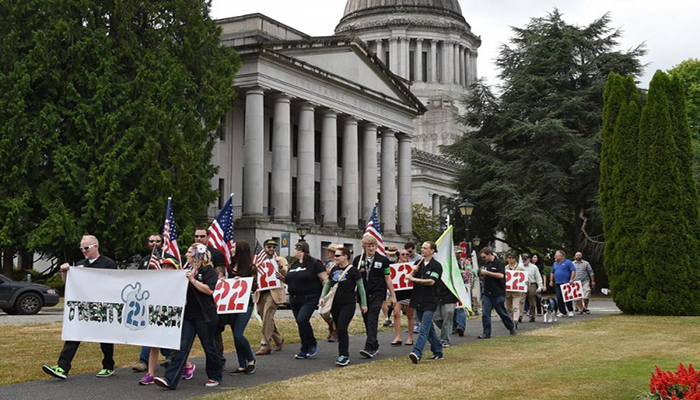The State of Washington Moves Forward for our Veterans:
while Colorado Leaves Them Behind
By Christopher Cano | Executive Director, Central Florida NORML
The State of Washington’s Legislature agreed this year to an overhaul of Washington’s
medical-marijuana system. These changes take effect Friday. They add PTSD and traumatic
brain injuries to the conditions a medical provider can cite in authorizing the medical cannabis
therapy. The formal research on pot as treatment for PTSD has been limited and inconclusive.
One state-funded Colorado study is just getting started. And, a study last year from the
University of Arizona was cut short when the school abruptly fired the lead researcher, Dr. Sue
Sisley, without cause. Yet, thousands of veterans in medical marijuana states are utilizing the
plant for treatment. After all this, the federal government remains unconvinced, although last
month the U.S. Senate did approve for VA doctors to recommend it in legal states.
Washington will be the 11th state to specifically include PTSD as a qualifying condition.
Medical-marijuana authorization cards aren’t traditionally difficult to obtain in Washington, and
the stores that dispense medical pot haven’t been heavily regulated. But the legal changes
taking effect Friday tighten language on medical conditions and crack down on providers
making a living churning out cards. Other parts of the overhaul law, Senate Bill 5052, hit next
year and force shops to obtain new state licenses or shut down. Activists are raising money for
a court challenge to the law and plan a rally Friday at the Capitol Campus.
But, a rally on Wednesday celebrated the parts of the law that provide new access for
military veterans. An average of 22 veterans commit suicide daily, according to one estimate
from the Department of Veterans Affairs. Hence the name the advocates have adopted:
Twenty22Many, pronounced “twenty-two too many.” Members meet at Rainier Xpress, a
downtown Olympia medical-marijuana shop whose owner Patrick Seifert is a lead organizer of the group.
Washington law now allows any adult 21 or older to buy marijuana in state-licensed
stores. But a medical authorization for PTSD is the right approach and many veterans hope the
VA will one day use marijuana as part of their treatment plan. Yet, all isn’t green in paradise.
Colorado health officials on Wednesday rejected a bid by medical marijuana advocates
to put cannabis on a list of approved treatments for post-traumatic stress disorder, an agency
spokesman said. While Colorado has allowed the use of medical marijuana to treat various
ailments since 2001, the state’s health board has three times refused to put PTSD on its
approved list. A similar proposal failed in the state legislature last year.
The spokesman, Mark Salley, said the Colorado Board of Health voted 6-2 to reject a petition
for PTSD to be included as a “debilitating condition” that can be treated with medical pot.
Having PTSD listed as a condition treatable with medical marijuana would allow
physicians to recommend strains that provide relief without the drug’s psychoactive properties,
and allow for improved tracking of its efficacy. The board cited insufficient medical evidence
that cannabis helps those afflicted with the mental-health condition.
The irony is that the members that voted against us stated a lack of scientific research
and data, and just voted against collecting such data. On its website, the health board says
medical marijuana may be recommended for sufferers of cancer, glaucoma, cancer and
HIV/AIDS. It also says cannabis may be recommended for people who have “a chronic or
debilitating disease” that produces persistent muscle spasms, extreme weight loss, severe pain and nausea or seizures.
As a former airmen, this author knows that we do not leave our fellow brothers in arms
behind. That is exactly what the bureaucrats in Colorado have done.


